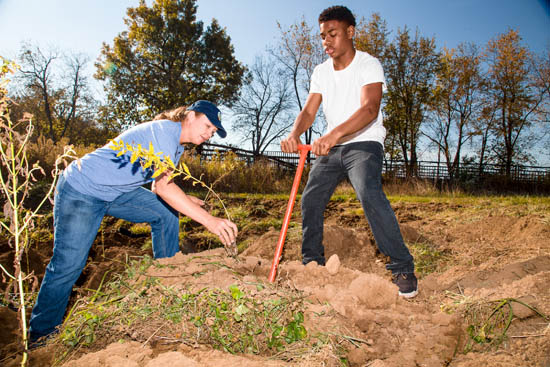Bee happy: Eighth graders plant native wildflowers in Cane Run watershed
Bee happy: Eighth graders plant native wildflowers in Cane Run watershed

Buzzing with excitement, 200 or so students swarmed off school buses and onto the farm.
The entire eighth grade class from Leestown Middle School in Lexington spread out along a tiny tributary of Cane Run Creek on the University of Kentucky College of Agriculture, Food and Environment’s Spindletop Farm. Under the direction of UK undergraduate and graduate students, staff and alumni, the middle-schoolers’ mission was to plant native wildflowers and wetland plants that will entice a variety of pollinators, including seriously threatened honeybees, as well as improve water quality in the heavily impaired Cane Run watershed.
“Every time we develop land or take away a lot of plant species that host pollinators, we’re taking away a home for them, so part of this project is giving back,” said Carmen Agouridis, associate professor of bioenvironmental engineering in the UK Department of Biosystems and Agricultural Engineering. “It makes sense. We’re on a UKAg farm here, we’ve got crops all around us, and this will give them (pollinating insects) a place with high native biodiversity where they can come.”
The students lined both sides of a stream channel so narrow that people could hop over it without getting damp. A few days earlier, the farm crew had cleared and tilled about 10 feet on both sides, leaving a rich, loamy, chocolate-colored soil in which the kids could easily dig. In less than an hour, the students—some enthusiastic, a few hesitant to get their hands or clothes dirty—planted 4,000 plants of 25 different species with interesting common names like lizard’s tail, monkeyflower, beggar’s ticks and sneezeweed.
“Cane Run is pretty heavily impaired from both urban and agricultural influences,” said Kenton Sena, a UK forestry doctoral student who showed a group of students how to plant. “If we can improve the quality of water that’s running down this small tributary and dumping into Cane Run, then we can improve the quality of Cane Run. Who knows how much of an impact it will have, but it will have some.”
The event capped off a weeklong series of educational events at UK called Water Week. Agouridis worked with Christopher Barton, forestry hydrology professor and director of UK’s Appalachian Center, on the project. They saw planting the area along the tributary, known as a riparian zone, and building an adjacent vernal wetland as an opportunity not only to improve water quality but also to educate students—both eighth graders and college students—about riparian restoration, water quality, habitat improvement and the decrease in honeybee populations. Visible from the Legacy Trail, the researchers believe they also have the opportunity to introduce walkers and cyclists to the importance of vernal wetlands—those that dry up during summer and fall—as well as pollinators and riparian zones.
“Over time I think we’ve cultured people into looking for this “golf course” look that’s a very smooth, manicured landscape,” Agouridis said. “Part of it is educating people on the look, to get them to understand that while it may look like weeds to them, there are a lot of valuable native flowers that provide benefit. It’s just not what we’re used to.”
The eighth graders certainly weren’t used to it, from their conversation. A few had gardened with their families, but most were new to this type of activity.
“We have the highest free and reduced lunch participation in middle school in Lexington and the poverty level is pretty high,” said Vint Collins, eighth grade science teacher at Leestown. “Our kids just don’t get exposed to things like this. Any time we can get them out and doing something out of their comfort zone, we’re all in.”
Collins hopes the field experience will spark some career ideas among the students. He and Barton have been discussing doing something like this for a year. Instead of just talking to Collins’ class about environmental careers, Barton suggested they get the students involved in a hands-on event.
“It was just one of those things where the stars were in alignment; we were planning this year’s Water Week, so I said why don’t we try to do this riparian restoration Carmen (Agouridis) and I have been talking about doing,” Barton said. “As Vint and I talked about it, it went from involving a single class to the whole eighth grade.”
Though some students steadfastly declared they wouldn’t want to do something like this when they grew up, there were several who ended up being very enthusiastic about their morning on the farm. That enthusiasm gives the educators hope.
“When I was in school, I became an engineer largely because I got to meet one,” Agouridis said. “Hopefully, something like this might open their eyes that there is a possibility for a career in this out there.”
Water Week was sponsored by UK’s Tracy Farmer Institute for Sustainability and the Environment;UK College of Agriculture, Food and Environment, UK Student Sustainability Council, UK School of Art and Visual Studies, UK Appalachian Center, and the Kentucky Water Resources Research Institute. Funding for the watershed project was provided by the U.S. Department of Agriculture Natural Resources Conservation Service and the U.S. Environmental Protection Agency. Excavation of the wetland was made possible through the donation of an excavator by Whayne Supply Company and labor by Ridgewater LLC and EcoGro.
Biosystems Ag Engineering Entomology Events Forestry & Natural Resources


